Aeroplan is Canada’s largest airline loyalty program—and one of its most lucrative. Owned by Air Canada, Aeroplan offers a ton of flexibility compared to other airline loyalty programs. You can redeem Aeroplan points with more than 50 partner airlines and even transfer points to other programs. Here are the best credit cards Aeroplan has to offer.
Featured credit cards

TD Aeroplan Visa Infinite Card

American Express Aeroplan Reserve Card

American Express Cobalt Card
MoneySense is an award-winning magazine, helping Canadians navigate money matters since 1999. Our editorial team of trained journalists works closely with leading personal finance experts in Canada. To help you find the best financial products, we compare the offerings from over 12 major institutions, including banks, credit unions and card issuers. Learn more about our advertising and trusted partners.
Compare Aeroplan credit cards
Whether you’re looking for a no-fee card to get you started earning Aeroplan points or a full-service travel card with all the bells and whistles, there’s an Aeroplan credit card for you.
| Annual fee | Rewards earn rate | Free checked bag with Air Canada | Nexus fee rebate | Recommended income | Recommended credit score | Apply now (featured cards only) | |
|---|---|---|---|---|---|---|---|
TD Aeroplan Visa Infinite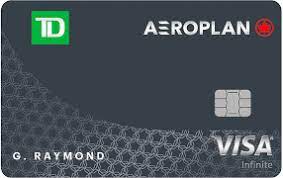 | $139 | Up to 1.5 Aeroplan points per $1 spent | Yes | Yes, every 4 years | $60,000 (personal) or $100,000 (household) | 680 or higher | Go to site |
CIBC Aeroplan Visa Infinite Card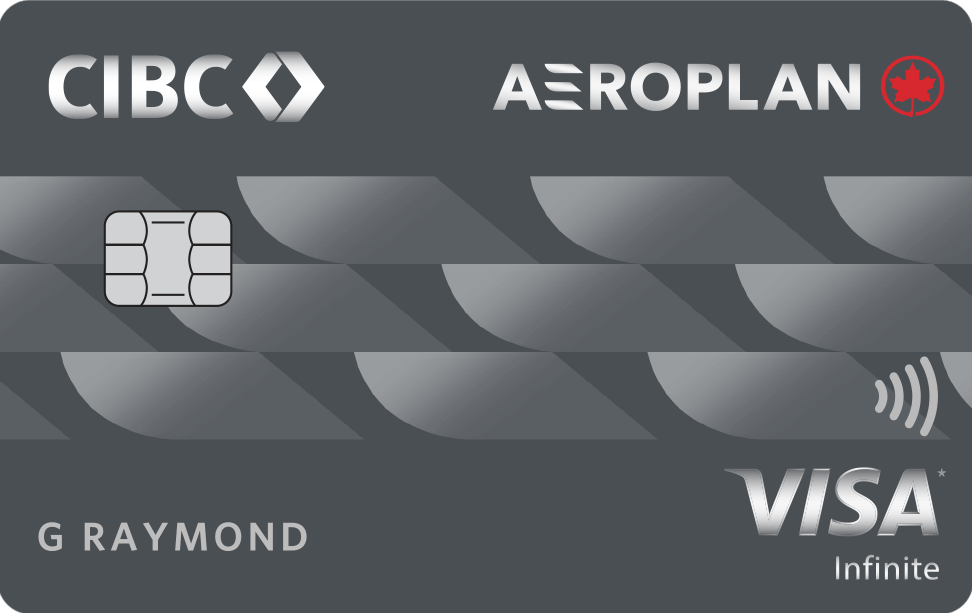 | $139 | Up to 1.5 Aeroplan points per $1 spent | Yes | No | $60,000 (personal) or $100,000 (household) | None specified | Not available |
American Express Aeroplan Card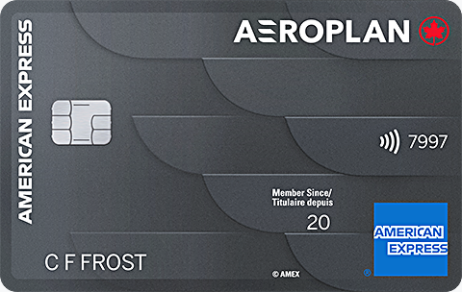 | $120 | Up to 2 Aeroplan points per $1 spent | Yes | No | None specified | 725 or higher | Not available |
American Express Aeroplan Reserve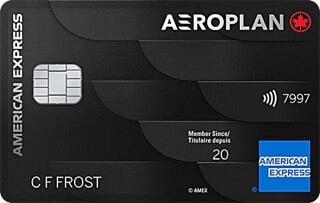 | $599 | Up to 3 Aeroplan points per $1 spent | Yes | Yes, every 4 years | None specified | 725 or higher | Go to site |
CIBC Aeroplan Visa Card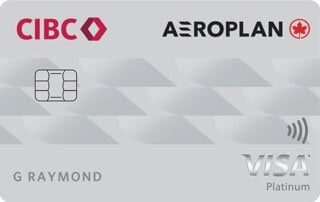 | $0 | Up to 1 Aeroplan point per $1 spent | Yes | No | $15,000 (household) | None specified | Not available |
American Express Cobalt Card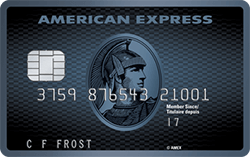 | $156 | Up to 5 Membership Rewards points per $1 spent | No | No | None specified | 725 or higher | Go to site |
MoneySense award winners
Check out the pros and cons of our top Aeroplan and premium Aeroplan credit cards, as well as a few alternatives for point collectors.
The MoneySense editorial team selects the best credit cards by assessing the value they provide to Canadians across various categories. Our best credit cards for Aeroplan rewards ranking is based on a few key criteria, such annual fees, welcome offers, reward earn rates and other perks. Our rankings are an unbiased source of information for Canadians. The addition of links from affiliate partners has no bearing on the results. Read more about how MoneySense makes money.
Best Aeroplan credit cards
Gold: TD Aeroplan Visa Infinite
At a glance: The TD Aeroplan Visa Infinite is tailored for frequent travelers seeking premium Air Canada perks and extensive travel insurance. Enjoy a Nexus fee rebate every 48 months, and free checked bags for you and eight companions when your travel begins on an Air Canada flight. Earn 1.5 points per dollar on gas, groceries and Air Canada purchases.
TD Aeroplan Visa Infinite Card
Annual fee: $139 (waived first year)
- 1.5 Aeroplan points per $1 on gas, EV charging, groceries and purchases
- 1.5 Aeroplan points per $1 on purchases made directly through Air Canada (including vacation packages)
- 1 point per $1 on all other purchases
Welcome offer: Earn up to $1,300 in value, including up to 40,000 Aeroplan points and no annual fee for the first year. Conditions apply.
Card details
| Interest rates | 21.99% on purchases, 22.99% on cash advances (21.99% in Quebec), 22.99% on balance transfers |
| Income required | Personal income of $60,000 or household income of $100,000 |
| Credit score | 680 or higher (recommended) |
| Point value | Aeroplan points are worth $0.02 on average |
Pros
- Extensive travel insurance: Includes coverage for travel medical (21 days; 4 days for those over 64), trip cancellation/interruption, flight delays, baggage, common carrier accidents, rental cars and hotel burglaries. Plus, get mobile device insurance.
- Free checked bags: Get free first-checked bags for you and up to eight travel companions on Air Canada flights, saving around $35 per economy traveller within Canada or the U.S.
- Nexus fee rebate: Get a Nexus application fee rebate every 48 months, worth up to $100.
- Reach Aeroplan Elite Status faster: Earn 1,000 Status Qualifying Miles and one Status Qualifying Segment for every $10,000 spent on the card.
- Earn points twice: Pay with this card and provide your Aeroplan number at partner brands and online retailers to earn points twice.
Cons
- High income requirement: It may be harder to qualify for this card.
- Low rewards: The bonus rate of 1.5 points per dollar on gas and groceries is rather low for a premium, annual-fee card.
Silver: CIBC Aeroplan Visa Infinite Card
At a glance: The CIBC Aeroplan Visa Infinite is another great option for Aeroplan collectors. This card is great for those prioritizing fuel/EV rewards, offering 1.5 Aeroplan points on gas, EV charging, groceries and Air Canada purchases, and a fuel discount at Chevron, Ultramar, or Pioneer stations with Journie Rewards. Plus enjoy travel insurance, free checked bags for you and eight companions on Air Canada flights, and preferred pricing on Aeroplan flight redemptions.
CIBC Aeroplan Visa Infinite Card
Annual fee: $139
- 1.5 points per $1 on gas, EV charging, groceries and Air Canada purchases
- 1 point per $1 on all other purchases
Welcome offer: Get up to 45,000 Aeroplan points (up to $900 in travel value).
Card details
| Interest rates | 20.99% on purchases and 22.99% on cash advances (21.99% for Quebec residents) |
| Income required | $60,000 (personal) or $100,000 (household) |
| Credit score | None specified |
| Point value | Aeroplan points are worth $0.02 on average |
Pros
- Extensive travel insurance: Includes coverage for travel medical (15 days; 3 days for those over 64), trip cancellation/interruption, flight delays, baggage, common carrier accidents, rental cars and hotel burglaries. Plus, get mobile device insurance.
- Free checked bags: Get free first-checked bags for you and up to 8 companions on Air Canada flights.
- Preferred pricing on redemptions: Get access to better point redemption rates for Air Canada flights.
- Earn points twice: Pay with this card and provide your Aeroplan number at partner brands and online retailers to earn points twice.
Cons
- Limited redemption value: Points have highest value when redeeming for Air Canada flights, limiting flexibility if you prefer other types of rewards.
- High income requirement: It may be harder to qualify for this card.
Best Amex option: American Express Aeroplan Card
At a glance: The American Express Aeroplan Card has a lower annual fee than most premium cards and offers higher rewards. Earn 2 points on Air Canada purchases and 1.5 points on dining and food delivery. Plus, get free checked bags for you and eight companions on Air Canada flights. Note that this card is a charge card, meaning that while you won’t be restricted by a spending limit, you’ll have to pay off the balance in full every month.
American Express Aeroplan Card
Annual fee: $120
- 2 Aeroplan points per $1 on Air Canada purchases
- 1.5 points per $1 on dining and food delivery purchases
- 1 point per $1 spent everywhere else
Welcome offer: Earn up to 40,000 Aeroplan points.
Card details
| Interest rates | n/a (Note: The American Express Aeroplan card is a charge card, so you’re required to pay off the balance in full with this card every month) |
| Income required | None specified |
| Credit score | 725 or higher |
| Anniversary bonus | earn 10,000 Aeroplan points when you spend $1,000 in purchases in month 13. |
| Point value | Aeroplan points are worth $0.02 on average |
Pros
- Decent travel insurance: Coverage includes travel accident, flight delay, baggage, hotel burglary, and car rental theft and damage.
- Free checked bags: You and up to eight travel companions get a free checked bag on eligible Air Canada flights.
- Reach Aeroplan Elite Status faster: Get 1,000 Status Qualifying Miles and one Status Qualifying Segment for every $10,000 you charge to the card.
- Earn points twice: Pay with this card and provide your Aeroplan number at partner brands and online retailers to earn points twice.
Cons
- Charge card: You must fully pay off the balance each month. Unpaid balances are subject to a 30% annual interest rate.
- Complex redemptions: Aeroplan points offer significant potential value, but their fluctuating point values may not be ideal for those wanting a straightforward rewards program.
- No mobile device insurance: Most premium cards offer coverage for new mobile devices.
- Amex acceptance: American Express isn’t as widely accepted as Visa and Mastercard.
Best premium Aeroplan credit card
American Express Aeroplan Reserve
At a glance: Designed for Air Canada loyalists, this premium card unlocks elite travel benefits like complimentary Maple Leaf Lounge access, airport benefits, companion passes, Nexus fee rebates and more. Plus, earn 3 points on Air Canada purchases, 2 points on dining/food delivery, and 1.25 points on everything else.
American Express Aeroplan Reserve
Annual fee: $599
- 3 points per $1 on Air Canada purchases
- 2 points per $1 on dining and food delivery
- 1.25 points per $1 on everything else
Welcome offer: Earn up to 85,000 points in the first 13 months.
Card details
| Interest rates | 21.99% on purchases and 21.99% on cash advances |
| Income required | None specified |
| Credit score | 725 or higher |
| Point value | Aeroplan points are worth $0.02 on average |
Pros
- Extensive travel insurance: Includes coverage for travel medical, trip cancellation/interruption, flight delays, baggage, hotel burglaries, travel accidents and rental cars.
- Airport lounge access: Unlimited Maple Leaf Lounge visits in North America for primary and additional cardholders and one guest on eligible Air Canada and Star Alliance flights.
- Premium airport benefits: Enjoy exclusive Air Canada perks like priority check-in and boarding, and a free checked bag on eligible Air Canada flights for you and up to eight travel companions. Get Toronto Pearson Airport perks like priority security, complimentary valet parking, and discounts on parking and car care services.
- Nexus fee rebate: Receive an application or renewal fee rebate every four years, of up to $100.
- Travel perks: Get an annual worldwide companion pass at a fixed base fare between $99 and $599. Also enjoy preferred pricing on Air Canada flight redemptions.
- Earn points twice: Pay with this card and provide your Aeroplan number at partner brands and online retailers to earn points twice.
Cons
- High annual fee: While the card offers impressive perks, the cost is quite high. You’ll have to maximize the card’s benefits to offset this cost.
- No mobile device insurance: Most premium cards offer coverage for new mobile devices.
- Limited redemption value: Points have highest value when redeeming for Air Canada flights.
- Amex acceptance: American Express isn’t as widely accepted as Visa and Mastercard.
Best Aeroplan credit card with no annual fee
CIBC Aeroplan Visa Card
At a glance: The CIBC Aeroplan Visa Card is an entry-level option for earning Aeroplan points without an annual fee. Not surprising for a no-fee card, there are no premium travel perks like those offered by the other co-branded Aeroplan credit cards. However, cardholders do get preferred pricing on flight redemptions.
CIBC Aeroplan Visa Card
Annual fee: $0
- 1 point per $1 on gas, EV charging, groceries and Air Canada purchases
- 0.67 point per $1 on all other purchases
Welcome offer: Get up to 10,000 Aeroplan points (up to $200 in travel value).
Card details
| Interest rates | 20.99% on purchases and 22.99% on cash advances (21.99% for Quebec residents) |
| Income required | $15,000 (household) |
| Credit score | None specified |
| Point value | Aeroplan points are worth $0.02 on average |
Pros
- Good first credit card: With no annual fee and a low minimum income requirement, this card is good for students, newcomers and other Canadians who want to start building up a credit score, while also earning travel points.
- Insurance: Get coverage for common carrier accidents and car rentals—decent for a no-fee card, along with the standard purchase security and extended warranty.
- Gas savings: Save up to 10 cents per litre at participating gas stations with Journie Rewards.
- Earn points twice: Pay with this card and provide your Aeroplan number at partner brands and online retailers to earn points twice.
Cons
- Low base earn rate: The rate of 1 point per $1.50 spent (0.67 points per $1) is less competitive than other no-fee cards.
- Complicated rewards program: New credit card holders may find it hard to get the best value for their Aeroplan points.
Best alternative for Aeroplan points collectors
American Express Cobalt Card
At a glance: The American Express Cobalt Card is an excellent choice for those seeking to maximize their Aeroplan points through everyday spending. Although it isn’t co-branded with Aeroplan, the card gives you an impressive earn rate of up to 5 Membership Rewards (MR) points per dollar spent. You can then transfer MR points to Aeroplan points at a 1:1 ratio. Thanks to its strong accelerated earn rates, which surpass other Aeroplan co-branded cards, you can earn more Aeroplan points with the Cobalt than with any other card.
American Express Cobalt
Annual fee: $156
- 5 points per $1 on dining and groceries
- 3 points per $1 on streaming services
- 2 points per $1 on transit and gas
- 1 point per $1 on all other purchases
Welcome offer: Earn 1,250 points for each month you spend $750, up to a maximum of 15,000 points.
Card details
| Interest rates | 21.99% on purchases, 21.99% on cash advances |
| Income required | None specified |
| Credit score | 725 or higher |
| Point value | 1 Amex Membership Rewards point = $0.01 when redeemed with the Flexible Points Travel Program, $0.015 on average with the Fixed Points Travel Program, and up to $0.02 with airline points transfers |
Pros
- High earn rates: Offers some of the most generous accelerated rates across major spending categories in Canada (especially the 5 points per $1 on groceries and dining).
- Flexible redemption options: You can redeem for flights using the Amex Fixed or Flexible travel program, transfer points to other loyalty programs like Aeroplan at a 1:1 rate, or redeem points for statement credits, gift cards and merchandise.
- Extensive travel insurance: Includes coverage for travel medical, flight delays, baggage, hotel burglaries, travel accidents and rental cars. Plus, get mobile device insurance.
Cons
- Amex acceptance: American Express isn’t as widely accepted as Visa and Mastercard.
Upcoming changes to Aeroplan partner rewards and charts
Starting March 25, 2025, Aeroplan is bringing back Etihad Business Class rewards, along with expanding its dynamic pricing model to include select partner airlines like United, Emirates, Flydubai, Etihad, and Canadian regional airline partners Canadian North, Calm Air and PAL (Provincial Airlines). This shift means redemption rates for these airlines will fluctuate based on demand and availability, similar to Air Canada’s current system. While this could improve access to award seats, it may also lead to higher point costs for popular routes or last-minute bookings.
The updated Air Canada and select partners reward chart will simplify pricing transparency by displaying a starting rate (unchanged from current fixed rates) and quarterly updated median amounts based on redemptions from the previous four quarters. This median aims to reflect typical costs, but note that median amounts may not appear in cases of low redemption volume (e.g., certain international short-haul ranges) or when only one carrier provides redemption options (e.g., First Class ranges with Emirates). Aeroplan Elite members and co-branded credit card holders will retain access to discounted rates on these flights.
Notably, fixed pricing remains unchanged for other Star Alliance partners like ANA, EVA Air, and Lufthansa, offering predictability for international itineraries. For some travels such as Arctic Canada, booking before March 25 may be advisable to lock in current rates. These changes balance flexibility with cost uncertainty, making strategic planning essential for maximizing Aeroplan’s evolving rewards.
How many Aeroplan points do you need for a flight?
When redeeming for flights on Air Canada, Aeroplan has introduced “dynamic pricing,” which means the number of points you need for a flight can vary within a range. This changes depending on your city of departure and arrival, whether you’re flying Air Canada or a partner airline, and whether you’re travelling during a high-demand travel season.
At a minimum, you’ll need at least 6,000 points to redeem a one-way ticket within the North America travel zone to any destination within 500 miles of your departure (or 12,000 points for a round-trip). That includes trips like Toronto to Ottawa, or Vancouver to Calgary.
The number of points you need for redemption increases as you go further from your departure city or enter a new travel zone. For example, you’d need at least 70,000 Aeroplan points for a round trip to the Atlantic Zone travel zone within 4,000 miles of your city of departure. Aeroplan has a handy points predictor tool to estimate how many points you need to redeem for a flight.
How much are Aeroplan points worth?
Unfortunately, because of the varying redemption cost described above, Aeroplan points don’t have a fixed value. However, you can use the formula below to decide whether you should redeem your points for a flight.
1 Aeroplan point = (price of ticket – Aeroplan fees) ÷ points needed to redeem
Generally, if you find that your 1 Aeroplan point is worth from 1.2 to 1.5 cents, you’re looking at a solid deal. Let’s use a round-trip flight from Calgary to Halifax as an example:
| Flight price | $850 (including taxes and fees) |
| Redemption price | 25,000 Aeroplan points |
| Calculation | ($770 – $80) ÷ 25,000 |
| Value of 1 Aeroplan point | $0.0276 (2.76 cents) |
Business class flights are also known to offer better value as their retail value is much higher, but you’ll need to rack up more points to redeem for those rewards.
Maximizing your Aeroplan points with Aeroplan’s stopover policy
Aeroplan has a great stopover policy that will help both casual and seasoned travellers stretch the value of their points.
When travelling almost anywhere (outside Canada or the U.S.) on Air Canada, you can add a stopover on each one-way flight for an incremental 5,000 points. Simply search for your award flight on the Air Canada website and select the “Add stopover for flight 1” to add your preferred stopover airport. By leveraging this stopover policy, you can strategically add stops on your routes, see more destinations, and maximize the value of your points.
How does Aeroplan Family Sharing work?
Aeroplan Family Sharing offers a streamlined way for families to combine their points and unlock rewards faster. Up to eight verified family members—including spouses, children, siblings, and grandparents—can pool their Aeroplan points into a shared balance while maintaining individual accounts. This feature is ideal for households aiming to maximize collective earnings for trips, upgrades or other redemptions.
How it works
Once a family lead (the pool creator) invites members, all points earned by participants automatically contribute to the shared pool. Redemptions draw proportionally from each member’s contributions, ensuring balanced participation. The Family Lead controls permissions, allowing some members to earn points without redeeming them—perfect for parents managing children’s accounts. A standout perk is preferred pricing on Aeroplan flights if the pool includes a primary Aeroplan credit cardholder, lowering point costs for everyone.
Note that dissolving a pool returns points to individual accounts, minus redeemed amounts. Points expire after 18 months of inactivity, but earning and redeeming points reset the clock for all contributors. Family Sharing doesn’t impact Elite Status progression or credit card benefits.
Benefits of Aeroplan Family Sharing
- Accelerated earnings: Combine occasional earners with frequent point collectors to hit redemption goals quicker.
- Flexible redemptions: Use pooled points for flights, hotels or experiences. Cancelled rewards refund points to original contributors.
- No transfer fees: Share points freely within the pool, avoiding external transfer fees.
Family Sharing eligibility and verification
After a 2023 pause due to misuse, Aeroplan reintroduced Family Sharing with stricter safeguards, ensuring families can safely collaborate toward shared travel goals. As of February 2025, Aeroplan requires account verification to create or join pools, enhancing security. Members must verify their identity via options like Air Canada flights, Aeroplan credit card matching or instant biometric checks. Existing pools remain unaffected, but any changes to permissions or new invites will require verification. You must wait six months before joining or starting a new pool, and family members must stay in the pool for a minimum of three months before they can leave.
How to earn Aeroplan points faster and gain Elite Status
With Aeroplan, the more flights you take and the longer the flights, the more points you earn. However, flying with Air Canada isn’t the only way to earn Aeroplan points. You can also earn rewards by:
Booking with travel partners: airlines, hotels, car rentals and vacation packages
Shopping via the Aeroplan eStore: you’ll earn points from popular retailers like Amazon, LCBO, Lululemon, Sephora, and more. Some partners, like Starbucks, Uber Eats, and Journie Rewards make it easy by allowing you to link your Aeroplan account.
Earning with Aeroplan retail partners also means that you can “double dip” or earn points twice if you have an Aeroplan credit card: once when you scan your Aeroplan membership card at the register, and again with the Aeroplan credit card.
How to fast-track your way to Aeroplan Elite Status
Aeroplan Elite Status can be achieved by earning a mix of Status Qualifying currencies, which include:
- Status Qualifying Miles (SQM): the amount of actual distance flown with Air Canada
- Status Qualifying Segments (SQS): the number of flight segments flown with Air Canada
- Status Qualifying Dollars (SQD): the amount spent on Air Canada flight tickets
Gaining Aeroplan Elite status is a little more tricky than earning Aeroplan points: to earn higher status and the travel perks that come with it, you’ll need to accumulate the following within a calendar year:
- A set number of SQM or SQS,
- AND a set number of SQD
Compared to the other four Elite Status tiers, Elite 25K Status, the first status tier above basic Aeroplan membership, is slightly easier to achieve. Instead of the above, you can also qualify by accumulating 100,000 Everyday Qualifying Dollars (EQD). This is based on the amount spent on your Aeroplan credit card via Aeroplan’s travel booking platform and the Aeroplan eStore. Beyond that, however, the best way to upgrade your Aeroplan status is to be a frequent flyer.
The full status qualification requirements can be found here.
Redeeming through Air Canada versus Star Alliance member airlines
Since Air Canada is a Star Alliance member, Aeroplan points can be redeemed for flights on Air Canada or any of the roughly two dozen Star Alliance member airlines. This makes Aeroplan points valuable for international travel to destinations where Air Canada doesn’t fly.
When redeeming on Star Alliance member airlines, which include United and Lufthansa, redemption costs are fixed (as opposed to Aeroplan’s dynamic pricing). For instance, the same round-trip flight from Calgary to Halifax always requires 25,000 points at any point in time. The one caveat is you’ll have to pay an extra $39 booking fee per traveller when flying on a Star Alliance airline versus using Air Canada itself.
When booking travel, you’ll want to compare between Air Canada and the other Star Alliance airlines to see which one offers the best return for your points.
Which Aeroplan cards come with lounge access?
Three Aeroplan credit cards provide airport lounge access:
- TD Aeroplan Visa Infinite Privilege Card: Allows access to Maple Leaf Lounges in North America for primary and additional cardholders, each of whom can bring a guest. This access is only available with a same-day ticket on a departing Air Canada or Star Alliance flight. You’ll also get complimentary access to the Visa Airport Companion Program by Dragonpass that gives you six free visits to over 1,200 lounges worldwide.
- CIBC Aeroplan Visa Infinite Privilege Card: Offers the same Maple Leaf Lounge and Dragonpass benefits as the TD Aeroplan Visa Infinite Privilege.
- American Express Aeroplan Reserve Card: Provides Maple Leaf Lounge access for the primary and additional cardholders (and one additional guest) on eligible Air Canada and Star Alliance flights.
Which Aeroplan cards come with a free checked bag?
Baggage fees are always rising, making free checked bags a coveted benefit for many travelers. Many Aeroplan credit cards offer this perk; better yet, the benefit is often not just for cardholders but also for those traveling with them on the same flight. The TD Aeroplan Visa Infinite Card and TD Aeroplan Visa Infinite Privilege card provide a free checked bag for the cardholder and up to eight companions (for a total of nine people) on the same reservation. The CIBC Aeroplan Visa Infinite Visa Card and CIBC Aeroplan Visa Infinite Privilege cards offer the same benefit, as does the American Express Aeroplan Card and the American Express Aeroplan Reserve card. Just note that the flight must be operated by Air Canada, Air Canada Rouge or under the Air Canada Express brand for the free checked bag benefit to apply.
Frequently asked questions
Do Aeroplan points expire?
Aeroplan points expire after 18 months of inactivity, meaning you haven’t earned, redeemed, donated or transferred your points. If you have an Aeroplan credit card, your Aeroplan account and points will remain viable.
Can I have multiple Aeroplan credit cards?
Yes, you can have multiple Aeroplan credit cards and have points from different cards allocated to the same Aeroplan account. However, if you’re thinking of getting multiple cards to take advantage of welcome bonuses and other perks, note that Aeroplan may consider this to be an abuse of these bonus offers. It may limit the bonuses you receive, suspend your account or terminate it altogether.